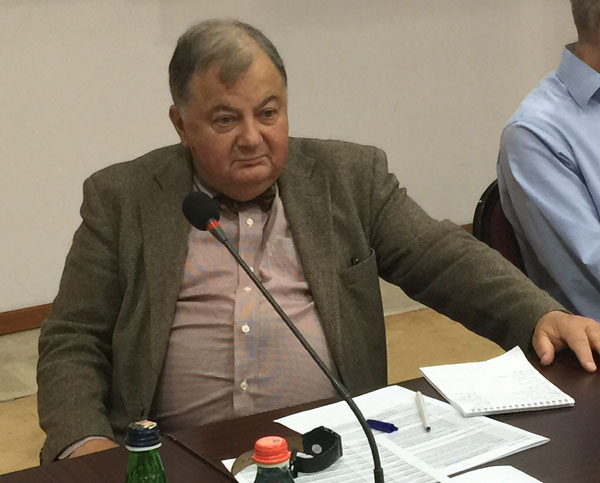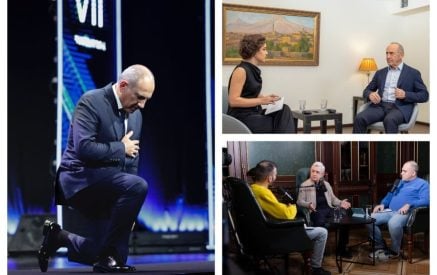Former US Co-Chair of the OSCE Minsk Group, Joseph Presel is proud for having personal contacts with Levon Ter-Petrosyan.
– Mr. Presel, you are involved in the Karabakh settlement process almost 20 years ago. Don’t you think that nowadays the parties have gone further far away from the opportunity to reach an agreement?
– I am first back to Armenia since 1998. In my opinion, the situation has been quite deteriorated. First of all, the people who were involved in the Karabakh settlement in Armenia and in Azerbaijan had personal relationships. They were speaking Russian, they were educated in the same schools and universities – in Moscow, they had personal contacts with each other, they were easily communicating without any problem. This period ended, the young Azerbaijanis do not know Armenia, and vice versa, and this cannot help. The next circumstance is that both you and the Azerbaijani have put up with the situation that there is no conflict settlement. Let me give you an example of the problem of Cyprus extended over 50 years, they have also coped with the situation.
– In other words, is the status quo maintained?
Read also
– Why not?
– Do you think it can last long in our region, given the Russian factor? Can’t it prevent in the preservation of the status quo?
– Russia is close to the region, you can do nothing with it. If Russia wants to complicate the situation, it has these capabilities and if it wants to seek settlement of the conflicts, it also has these capabilities. But in my opinion, Russia seeks not to normalize the conflicts, in which case, Russia would have the leverage to put pressure on you and on Azerbaijan.
– Well, why did the parties fail reaching an agreement and sign an agreement on an earlier period right after the ceasefire or a few years later?
– It is a complicated question. I believe both you and Azerbaijanis want to find a solution by which both parties would receive 100 percent of their desires, there was no intention to compromise. It was also a matter of time. At that time, what was to the benefit of Ter-Petrosyan was not to the benefit of Heydar Aliyev, and vice versa. In addition, in my opinion, Russia did not want to reach a solution while we alone were not capable.
– But after the war, during the period of signing the ceasefire, Russia appears to be more active in the peace process. For example, everyone remembers Vladimir Kazimirov’s active work and his efforts to achieve peace.
– I am sorry, but above all, it was a part of the Russian Empire and then the Soviet Union, it was a region not far from Russia, which played a greater role for Moscow rather than for Washington.
– As a diplomat negotiated with Haydar Aliyev, what do you think are there differences between Heydar Aliyev and Ilham Aliyev? If you compare the current Azerbaijani president’s rhetoric with his father’s policy, do you see any difference? In particular, there is a belief that the younger Aliyev is different at the negotiating table while returning to his country he is another Aliyev, more militant and uncompromising.
– I had personal contacts with Heydar Aliyev, and I respected him as a politician. I was acquainted with his son and have seen him two or three times during my mission. I cannot say anything about the young Aliyev as I do not know him.
– What kind of relationship did you have with Levon Ter-Petrosyan? What is your opinion about him?
– I have a great respect to Levon Ter-Petrosyan for firstly as a scientist, he is a serious academician. In my opinion, he is very humanitarian. I have spent many evenings with him, I am extremely proud that we have had personal contacts, which I hope are preserved until this day, and I will meet him.
– The recent West-Russia tension, in your opinion, what influence did it have in the former Soviet Union countries? Is Russia strengthening its positions or it is an illusion, and in the future, we can witness the backfire of Russia’s aspirations? Does Putin’s Russia have a future?
– If I could answer this question in detail, then I probably would have worked on Wall Street and would be a rich man … (he laughs). Putin complicates everyone’s life. Yes, he has the Crimea, here you are, he may even have the Donbas, here you are. But it is evident that Russia’s economic situation is deteriorated. The freedoms that the Russians had are gone.
Now, there’s no money, and I do not know when the sanctions on the Russian borders would be ceased. Russia is the only country in the world where the mortality age is reducing, and it is terrible. This country has huge problems, and even if they do not admit it, these problems anyway, alas, are not resolved.
– Let’s go back to the US policy in our region. One gets an impression that the West is reluctant entering into a tough fight with Russia. Our region seems is not a priority for Washington. By the US perception, is this a Russian influenced region?
– For us and the Americans, there is no such a thing. Yes, there is oil and gas, yes, there is Iran, there is a problem of terrorism, but, for example, the Nagorno-Karabakh conflict, no, they do not know anything about it. For Americans, Armenia is a genocide and William Saroyan, period.
– Or Kim Kardashian … She is very popular in your country, isn’t she?
– I’ve heard about her … To the point, I would like to add that the influence of the Armenian diaspora in the US is gradually dropping.
– What is the reason?
– Maybe I’m mistaken, but I think the reason is that there is an independent Armenia, secondly, 100 years have elapsed since the genocide, the American diaspora is losing the idea of returning to their homeland, and they become American-Armenians, like the Irish Americans or Italian Americans.
Emma GABRIELYAN, “Aravot” daily























































